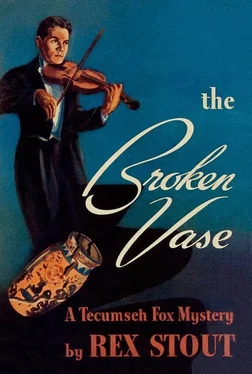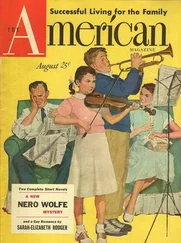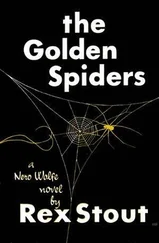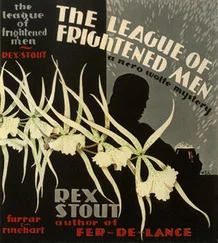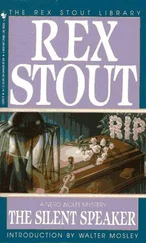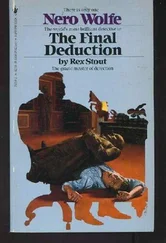“Is that right? Did you say there were two notes?”
She nodded with a heavy head. “I guess I did. I thought I saw two — but of course I was wrong. I saw them when I was standing there and Jan had the gun and Perry was getting closer to him. It was just an impression — it must have been wrong, because Perry says he only saw one. Oh, does it matter?”
The captain bore down. “Then you are not prepared to state positively that you saw two notes?”
“Oh, no — there must have been only one—”
“You saw only one, Mr. Dunham?”
“Of course.” The youth darted an unfriendly glance at Adolph Koch. The older man ignored it and said in a skeptical tone to the girl:
“You have very good eyes, Dora.” He looked at the captain: “It really does seem probable that there were two notes and that someone took one of them.”
The captain demanded testily, “What’s your name?”
“Adolph Koch. Manufacturer of dresses and suits. Admirer of the arts.”
“Do you make a point of this? Do you think I’m going to ask these ladies and gentlemen to permit me to search their persons?”
“By no means.” Koch was unperturbed. “I wouldn’t even permit you to search me. I mentioned the matter only because you asked if anyone had anything to add.”
“Well, have you anything else?”
“No.”
“Has anyone?”
The expression on the captain’s face did not invite further contributions, but one came. A baritone inquired politely, “May I make a suggestion?”
Another voice spoke from the rear, “That’s Tecumseh Fox, Captain.”
“Here as a spectator only,” Fox got in hastily. “I was just going to suggest, before you send us off, do you think it would be a good plan to have Mr. Beck take a look at that violin? In view of his doubt of its identity?”
“Certainly, I wasn’t forgetting that, of course—”
“Before we leave? If you don’t mind?”
The captain addressed Felix Beck: “Can you identify Tusar’s violin?”
“Naturally,” Beck replied, as though he had been asked if he could identify his own face in a mirror.
“All of you please remain a moment,” said the captain, and went to the dressing room and entered, closing the door behind him. There was a cessation of the other muffled sounds from within; voices could be heard, but not words; and then the captain reappeared. He closed the door and turned to confront them, and the scowl on his face was considerably more pronounced than it had been when Koch had raised the question of the notes. He surveyed the audience for a long moment in silence, and when he spoke his tone was one of dry disgust.
“There’s no violin in there.”
Ejaculations, gasps, startled movements were the response to that. Felix Beck darted for the dressing-room door, but one of the census takers grabbed him by the arm and held him. Half a dozen people were declaring that it was impossible, they had seen it there, and the captain was lifting a hand to restore the meeting to order when the confusion gained a new recruit from without. The door at the far end burst open and a woman entered — her mink coat flying open, her dark agitated eyes in her pale face seeing none of them, her red lips parted for panting. She rushed across through the lane they made, toward the dressing room, until she was stopped by the captain, who blocked her way.
Adolph Koch marched toward her, calling sharply, “Garda! You shouldn’t have—”
She was clawing at the captain. “My brother! Jan! Where is he—”
Tecumseh Fox quietly retreated to the corner he had pre-empted before.
I don’t agree,” Diego Zorilla said with conviction. “I don’t agree at all. It was a sensible thing for Jan to do. I should have done it myself when I lost my fingers. As for the violin, I don’t believe it. If any substitution had been made, Jan couldn’t possibly have failed to know it.” He drank, put the glass down, and shook his head. “No, it was simply stolen, that’s all. Though how and by whom...”
“Yes, you might let me in on that,” Fox suggested.
They were sitting in Rusterman’s Bar, having finally left Carnegie Hall around midnight. The last two hours there had been productive of no result whatever, except the negative one that Jan Tusar’s violin could not be found. There seemed to be no question that it had been in the dressing room immediately after Tusar had shot himself. Everyone denied having removed it or even touched it, but it was generally admitted that in the confusion and excitement it could easily have been taken without observation. A careful check had established with a fair amount of certainty that only three people had left the scene before the arrival of the captain: a Mrs. Briscoe, a Mr. Tillingsley, and Miss Hebe Heath. Men had been sent to interview them, and they had all denied any knowledge of the violin. It was true that there had been overcoats and women’s wraps around, under one of which the instrument could easily have been carried unseen, and any of those present might have been away for a few minutes without its being remarked, but a search of the entire building was fruitless.
In the comfortable little booth at Rusterman’s, Diego had told Fox that of the three persons who had left the scene before the arrival of the police, Mrs. Briscoe was the lady whom Fox had characterized as a skeleton in sable and could be dismissed from consideration as a fiddle thief; Mr. Tillingsley was the concert master of the Manhattan Symphony Orchestra, equally above suspicion; and, though Hebe Heath was a movie star and therefore not subject to the normal processes of reason or logic, it seemed unlikely that she would steal a violin to the purchase of which she had contributed the substantial sum of two thousand, five hundred dollars.
Fox inquired, “Is she also an admirer of the arts?”
“She was an admirer of Jan Tusar,” said Diego in a certain tone. “Jan was a very romantic figure. He was, in fact, truly romantic — as he proved tonight. And as I am not. I am a realist. When my fingers were smashed in an accident and they had to go, taking the best of me with them, did I finish the job? Not me. I accepted your hospitality — your charity — and for months stayed at your place in the country, because a realist has to eat. Shall we have another drink? And now I arrange music for the Metropolitan Broadcasting Company.”
“A lot of people listen to it. Anyhow, you’re all right. Tell me about some of those other people.”
Diego told him. It was understood, he said, that Tusar had entertained the idea of marrying Dora Mowbray, but it had not been encouraged by Dora and had been unrelentingly opposed by her father. When, a few months ago, Lawton Mowbray had tumbled from his office window to his death, there had even been murmurs about the possibility that Jan Tusar had sent him on that last journey in order to remove an obstacle from the path of true love; but, Diego said, that had been merely a drop of acid from rumor’s unclean tongue, for Jan hadn’t been so romantic as all that. After an interval Dora had consented to act again as Jan’s accompanist; firstly, because Jan insisted that otherwise he could not play, and secondly, because she needed the money; for, though Lawton Mowbray had been an extremely successful manager of artists, he had spent more than he had made and had left nothing but debts, pleasant memories, and a penniless daughter.
Fox remarked that young Mr. Dunham seemed to be on terms with Miss Mowbray.
Diego snorted and said he hoped not. Perry Dunham was an arrogant young ape, incapable of appreciating one of so true a loveliness as little Dora. He called her “little Dora” because when he had first met her, six years ago, she had been only fourteen and had legs like a calf. Even now, he admitted, she lacked somewhat in roundness for a Spaniard’s taste, but she was undeniably lovely, and she could even make pretty good music. As for Perry, he thought swing was music, which — judging from Diego’s tone — settled him. The only reason he ever set foot inside Carnegie Hall was to keep on the good side of his rich mother, Irene Dunham Pomfret, who was the financial godmother of enough musicians to make up a Bethlehem Festival. Garda Tusar, Jan’s sister, was more his type than Dora Mowbray.
Читать дальше
